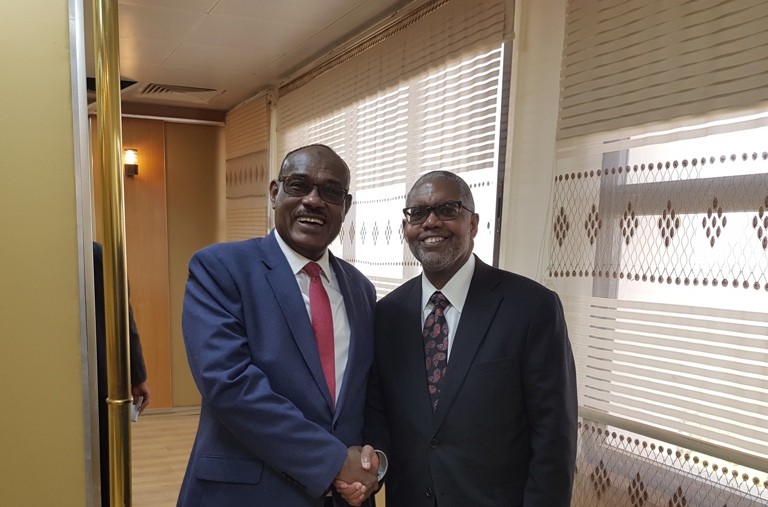U.S. says Sudan going through “complex transition”

February 18, 2019 (KHARTOUM) – Special Assistant to the U.S. President and Senior Director for Africa at the National Security Council (NSC), Cyril Sartor, on Monday said Sudan is going through a complex transition”.
Sartor on Monday has discussed the second phase of the Sudanese-American dialogue with the Sudanese Presidential Assistant Faisal Hassan Ibrahim. He also met with Sudan’s Foreign Minister El-Dirdeiry Ahmed and the Speaker of the National Assembly Ibrahim Ahmed Omer.
In press statements following the meeting at the Sudanese presidency, Sarter called on the Sudanese government to respect the right of its citizens to express their views peacefully, demanding protesters to abide by the same thing.
“We have been having very productive meetings with the Presidential Assistant and other senior officials in Khartoum, we are here to encourage the government of Sudan to continue working constructively with the United States,” he said.
The U.S. official added they seek to keep the phase two of the dialogue on track, hoping the dialogue “in the not too distant future” could lead to the removal of Sudan’s name from the list of states sponsors of terrorism.
He pointed out that he is aware of the recent “significant turmoil in Sudan”, saying “we have heard voices of the opposition” and “we understand that Sudan is going through a complex transition”.
“We are here to ask that the government respects the right of people to express themselves peacefully. We ask that all those who wish to express their views would do so peacefully,” he said.
He added “Sudan would find its own solutions”, stressing “there are no external solutions to be imposed on Sudan”.
The visiting official said his government believes that working with Sudan would enable it to find peaceful and political solutions and the two countries “would find their way back to a strong partnership”.
For his part, Ibrahim renewed his government’s commitment to engage in dialogue with Washington on all issues of common concern.
Meanwhile, in a short statement on its Facebook page, the U.S. embassy in Khartoum said Sartor came to Sudan “to discuss U.S.-Sudan relations, including concerns about the frequent use of force by the Sudanese government’s security forces to quell recent demonstrations”.
It pointed out that the visiting official has also met with the Speaker of the Sudanese Parliament Ibrahim Ahmed Omer.
“In his meeting with the Speaker of the National Assembly, Mr Sartor also voiced U.S. concerns regarding religious freedom and humanitarian access,” said the embassy.
Sartor’s visit comes two days after the U.S. Secretary of State Mike Pompeo expressed hope that calls by Sudanese people for regime change will be heard.
Sudanese continue to organise daily protests including demonstrations, sit-ins and meetings despite the brutal crackdown by the police, security forces and militiamen of the ruling National Congress Party.
Since December 2019, some 31 people were killed across the country according to the Sudanese authorities but activists and rights groups say the death toll is over 50 people.
In October 2017, the U.S. Administration permanently lifted 20-year-old economic sanctions against Sudan citing positive actions on humanitarian access and counter-terrorism.
The decision was in line with the “Five Track Engagement Plan”, in which Khartoum agreed to a cessation of hostilities with the armed groups, opened unfettered humanitarian access in the conflict-affected areas, agreed to support efforts for peace in South Sudan and developed cooperation with the U.S. to counter terrorism in the region.
However, Washington didn’t remove Sudan’s name from the list of state sponsors of terrorism. In addition, it keeps in place targeted sanctions against individuals with arrest warrants related to atrocities committed during the conflict in Darfur.
In November 2018, the two sides agreed to develop a new plan labelled the “five-track engagement +1” to say it would include important parts of the previous five-track engagement that led to the lift of the economic sanctions.
The focus in the new plan will be on the human rights and freedoms particularly religious freedom.
(ST)
